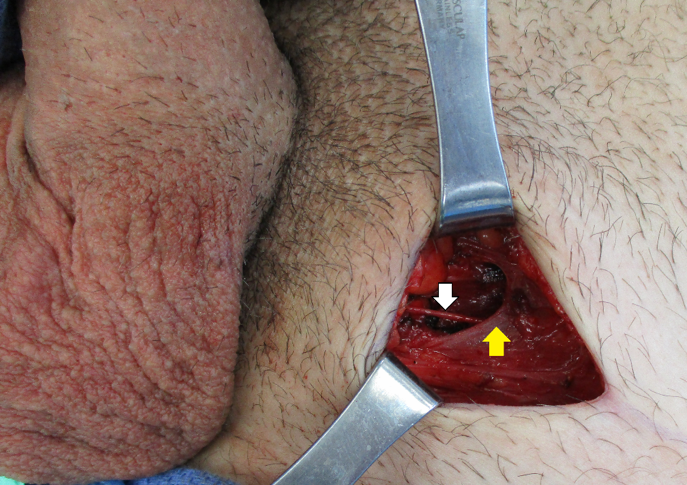Testicular cancer has become a model for curable neoplasms due to the remarkable treatment advances in the past 40 years. Despite the gradual increase in the incidence of testicular cancer in the US, the mortality rate has remained almost unchanged during the past two decades. Patients with testis cancer are mostly diagnosed as clinically stage I disease which is cured with orchiectomy alone in the majority of cases. Furthermore, a recent shift toward patient-centered management has been associated with a reduction in adjuvant therapies in stage I disease and a decrease in the burden of treatment.
In this review, we discussed different aspects of the primary, especially stage I, testicular cancer management. We reviewed radical orchiectomy that is the standard procedure for diagnosis and treatment of testicular tumors. We presented the technique of fascia-preserving radical orchiectomy (FPRO) which is performed through an inguinal incision, yet without opening the external inguinal ring (Figure 1). FPRO is presumed to be associated with decreased postoperative pain and faster recovery compared to the standard technique for radical inguinal orchiectomy. We also discussed prosthesis placement in patients with testicular tumors. The testicular prosthesis should be discussed before surgery in all patients undergoing radical orchiectomy. Synchronous testicular prosthesis placement is associated with a very low risk of morbidity, malposition, deflation, or need for explant with more than 80% overall satisfaction rate.
Figure 1. Fascia-preserving radical orchiectomy for left testicular tumor. Yellow arrow: intact external oblique aponeurosis; White arrow: ilioinguinal nerve.
We also reviewed the role of delayed orchiectomy (following systemic therapy) in a subset of patients with widespread or life-threatening advanced disease. Based on our USC testis cancer database, about 15% of patients undergoing post-chemotherapy RPLND has delayed orchiectomy done either before or at the time of retroperitoneal surgery. The benefit of delayed orchiectomy has been confirmed in previous studies showing viable tumor or teratoma remained in more than 50% of orchiectomy specimens after chemotherapy.
Lastly, we reviewed the indications, technique, and outcomes of testis-sparing surgery (TSS) in patients with testicular cancer. TSS may be offered as an alternative to radical orchiectomy in highly selected patients with small testis mass (i.e. <2cm) and solitary testicle, synchronous bilateral testicular tumors, or strong suspicion of a benign lesion (i.e. equivocal ultrasound/physical exam findings and negative tumor markers). The standard approach of TSS is similar to radical orchiectomy with extra biopsies of normal ipsilateral testis parenchyma that should be evaluated by an experienced genitourinary pathologist. The patients who undergo TSS have higher risk of local recurrence which necessitate the need for close monitoring with physical examination and imaging. These patients should be counseled regarding the possible need for adjuvant radiotherapy to the testicle to reduce local recurrence.
In summary, this review serves not only as a modern reference but also as a guide for optimal management of patients with primary testicular tumors.
Written by: Alireza Ghoreifi, MD and Hooman Djaladat, MD, MS, Institute of Urology, Norris Comprehensive Cancer Center, University of Southern California, Los Angeles, CA, USA
References:
- Ghoreifi A, Djaladat H. Management of Primary Testicular Tumor. Urol Clin North Am. 2019;46(3):333-339. doi: 10.1016/j.ucl.2019.04.006.
- Djaladat H. Organ-sparing surgery for testicular tumours. Curr Opin Urol. 2015;25(2):116-20. doi: 10.1097/MOU.0000000000000150.
- Clifford TG, Burg ML, Hu B, Loh-Doyle J, Hugen CM, Cai J, Djaladat H, Wayne K, Daneshmand S. Satisfaction with testicular prosthesis after radical orchiectomy. Urology. 2018;114:128-132. doi: 10.1016/j.urology.2017.12.006.
- Stephenson A, Eggener SE, Bass EB, Chelnick DM, Daneshmand S, Feldman D, Gilligan T, Karam JA, Leibovich B, Liauw SL, Masterson TA. Diagnosis and Treatment of Early Stage Testicular Cancer: AUA Guideline. J Urol. 2019;202(2):272-281. doi: 10.1097/JU.0000000000000318.


